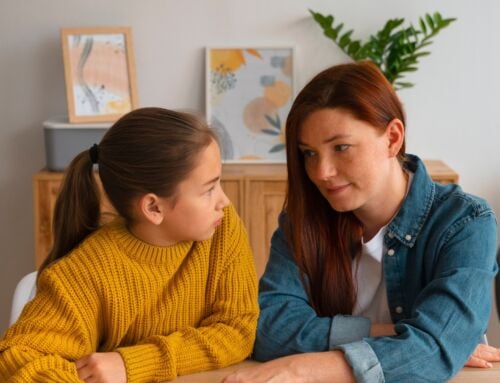Talking to a loved one about their body image can feel like walking a tightrope, you want to show you care without saying the wrong thing. If you’ve ever wondered how to talk to someone about body image, you’re not alone. These conversations may be uncomfortable, but they can also be powerful opportunities for connection, reassurance, and in some cases, healing.
Whether you’ve noticed changes in their eating habits, self-talk, or confidence, approaching the topic with sensitivity and support can make a real difference. In this blog, we explore how to gently open the dialogue, what to say (and what not to), and how to be a steady support for someone navigating body image struggles.
Why is it important to address body image concerns?
Poor body image is often linked to more serious mental health conditions like anxiety, depression, and disordered eating. It is also important to be aware that diet culture surrounds us and can make it difficult to have helpful conversations about food, exercise, and bodies. Talking about it can be a first step toward healing, understanding, or seeking professional help.
What is diet culture?
Diet culture promotes the idea that thinness equals health, beauty, and worth – and it’s everywhere. Even when we don’t realise it, it shapes how we talk about food, bodies, and exercise. Complimenting weight loss, feeling guilty for eating certain foods, or labelling foods as “good” or “bad” are all subtle signs. Over time, diet culture can lead to body shame, disordered eating, low self-esteem, and a constant feeling of not being “enough.” It distracts us from listening to our bodies and valuing ourselves as we are. Recognising it is the first step toward rejecting it.

Subtle signs someone may be struggling with body image
Struggles with body image can be subtle and easy to miss, often showing up in quiet, everyday behaviours. You might notice someone frequently criticizing their appearance, even in a joking way, or comparing themselves to others more than usual. They may begin to skip meals, avoid eating in front of others, or talk about food with guilt or shame. Socially, they might withdraw from events that involve food, photos, or specific clothing like swimsuits, and they may seem anxious about how they look. Some people start wearing oversized clothes to hide their body or become fixated on checking mirrors or avoiding them entirely. Changes in mood, like increased irritability, low self-esteem, or anxiety, can also be signs, especially if they begin tying their worth to their weight, shape, or fitness. While none of these signs alone confirm someone is struggling, together they can signal it’s time to gently check in and offer support.
How to Talk to Someone About Body Image: 5 Gentle Steps
Step 1: Prepare for the Conversation
- Reflect first: Why do you want to bring this up? What are your concerns?
- Pick the right time: Choose a quiet, private moment without distractions.
- Educate yourself: Understand the basics of disordered eating and body image issues.
Step 2: Start the Conversation Gently
Use “I” statements and focus on care, not accusation.
Examples:
“Hey, I’ve noticed you’ve seemed a bit stressed about food and your body lately. I just want to check in, how have you been feeling?”
or
“I care about you and have been a bit worried. Can we talk about something I’ve noticed?”
Tips:
- Keep your tone calm and kind.
- Avoid labels like “eating disorder” unless they bring it up.
- Don’t try to diagnose or assume. Take a curious approach with the intention to understand.
Step 3: Listen Without Judgement
Let them speak freely. Avoid fixing or debating.
Do say:
- “That sounds really hard, thank you for telling me.”
- “I’m here to support you, not to judge.”
Don’t say:
- “You don’t look like you have a problem.”
- “Just eat more/less.”
- “Everyone feels that way.”
Step 4: Offer Support, Not Solutions
Ask what they need instead of telling them what to do.
Try:
- “Would it help to talk to someone like a counsellor/psychologist? I can help you find someone.”
- “Is there something I can do to support you, like walking with you to class or just listening?”
Reminder:
You don’t need to have all the answers. Just showing up matters.
Step 5: Follow Up & Respect Boundaries
Be consistent without being intrusive.
Check in:
- “I’ve been thinking about our chat the other day. How are you doing this week?”
- “I’m always here if you want to talk more, no pressure.”
If they’re not ready:
Respect their space but let them know you’re a safe person to talk to when they are.
Supporting Loved Ones with Body Image Concerns
Starting a conversation about body image with a loved one isn’t easy, but it can be one of the most caring and meaningful things you do. By approaching the topic with empathy, patience, and an open mind, you help create a space where they feel seen, supported, and not alone. You don’t need to have all the answers, just being there, listening without judgment, and encouraging self-compassion can make a lasting impact. Together, we can challenge harmful messages, nurture healthier self-image, and remind each other that our worth is never defined by appearance.
If you’re concerned about a loved one’s body image, reaching out to a psychologist, counsellor or GP can be a helpful first step.

Our psychologists provide support for children, teens, and adults, helping to build confidence, self-esteem, and healthier patterns of thinking.
Beam offers psychology services at our Kedron, Warners Bay, West Gosford, Tuggerah and Cessnock clinics.
Contact us today to book an appointment or learn more about how we can support you or your family.
Additional Resources
Watch Positive Role Modelling from The Butterfly Foundation
Find fact sheets, information and resources from Butterfly Foundation
Resources and information for families and supports from National Eating Disorders Collaboration
Body image and self-esteem for teens from Nemours KidsHealth









